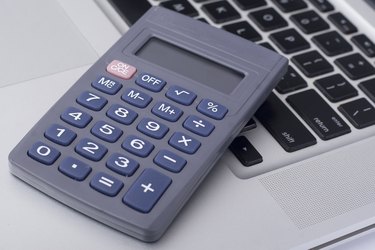
Every electronic calculating device -- from the humble four-function calculator to the most powerful supercomputer --runs from the same basic computation techniques, which are based off of Boolean algebra. At their most basic functions, computers and calculators use binary arithmetic, and do translation to decimals at their last step before they're displayed. In spite of sharing the same fundamentals, calculators and computers have a divergent history.
General Differences
Video of the Day
Calculators are single-purpose devices that perform mathematical operations input by the user. Simple calculators just do four-function math, while more advanced calculators handle trigonometric functions, take square roots, and graph equations for solving algebra problems. While some calculators can store series of instructions, they don't run programs that interact with the user or take user input. Computers are calculators that have vastly expanded capabilities, and are often called "general purpose computing devices." Computers can do everything a calculator can do. Every graphical user interface operating system has a virtual calculator, as do most cell phones.
Video of the Day
History of Consumer Calculators
The commercial four-function calculator first hit the market in the 1970s; prior to its arrival, most engineering mathematics was done with slide rules, which required fairly extensive training to use and had a high error rate. Four-function calculators small enough to fit in a belt pouch were advertised midway through the decade, with prices of around $100 – by way of comparison, a brand new car was in the $4,000 range. Calculators dropped in price rapidly from the 1970s to the beginning of the 1980s, and were one of the first consumer electronics devices to follow a pattern called Moore's Law, where the number of transistors on a chip (and thus the computing power) doubles roughly every 18 months.
Size and Functionality
Because calculators are so much simpler than computers, as CPU technology advanced, they got very power efficient very quickly. In the case of calculators, they also got very small very quickly. By the mid-1980s, calculators had moved into watches and were treated as disposable items given away when you opened a bank account. Now, most calculators are sized in conjunction with human factors – bigger buttons and bigger displays are easier to use, for example. Computers have also gotten smaller – laptops and tablet computers' sizes and weights have dropped considerably over the last five years and are likely moving to the point where calculators are, where the size of the device isn't limited by the electronics, but by how people use it.
Power Usage
Calculators were among the first devices to not only shrink in size, but gain in power efficiency by doing so. By the early 1980s, most calculators ran on watch batteries, and by the middle of the decade, they were running off of photovoltaic solar cells. While computers have also gotten more power efficient, their multi-function use means there's always some program that needs more computation capability…and the power efficiency gains are offset by adding more capability.
Comparable Utility for Similar Functions
While most serious accounting and number crunching is done on computers with spreadsheets and financial software packages, calculators are still used everywhere. Every time a cashier scans an item and accepts a payment at a cash register, the cash register is functionally a calculator tied to a cash drawer. Meanwhile calculators show up in bank waiting areas and are used by the teller to double-check your math on deposit and withdrawal slips…and nearly every cell phone made in the last 20 years has had a calculator program.